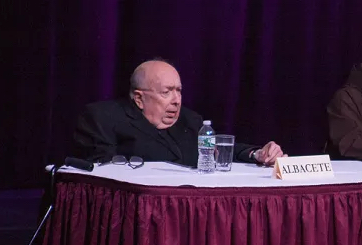Msgr. Lorenzo Albacete (1941-2014) was born in Puerto Rico, majored in physics and aerospace science, and was ordained in 1973. He was a New York City-based public intellectual and became close friends with both St. Pope John Paul II and Pope Benedict XVI.
Notoriously rumpled, perpetually late, he chain-smoked, loved food, drink, and good conversation, and had a wicked sense of humor.
I’ve written here of his 2021 book “The Relevance of the Stars: Christ, Culture, Destiny” (Slant Books, $19).

In February, Slant Books launched a new title from Msgr. Albacete: “Cry of the Heart” ($16), an extended meditation on the mystery of suffering.
Referencing C.S. Lewis’ autobiographical “A Grief Observed,” he poses the quandary for so many: “This suffering [of the death soon after they were married of Lewis’ wife] did not make him doubt God’s existence; rather, it made him doubt God’s goodness.” He respects and commiserates with those who rage at God. Still, anger cannot, he insists, be the last word.
The cruelest response, says Albacete, is that of Job’s “friends”: to try to minimize the suffering by explaining it away. Rather, our response must be to suffer along those who cannot in all good conscience believe. “To co-suffer is to be willing to serve on the jury in the trial of God and to risk our own faith by identifying with those who suffer in their questioning of God.”
For those who can’t even ask the questions — we ask for them.
And while we can’t alleviate suffering with neat, pat answers, neither can our response purport to be more “tender” toward the sufferer than God is.
Catholic writer Flannery O’Connor observed that in the absence of faith, “we govern by … a tenderness which, long since cut off from the person of Christ, is wrapped in theory. When tenderness is detached from the source of tenderness, its logical outcome is terror. It ends in forced labor camps and in the fumes of the gas chamber.”
Such tenderness leads to old people, poor people, disabled people, being urged to end their lives. It ends in the abortion clinic. It ends in the surgical and chemical mutilation of perfectly healthy bodies.
“Our contemporary culture employs a deeply mistaken approach to dealing with human suffering,” Albacete sums up.
To illustrate, he points to Nathaniel Hawthorne’s short story in which a husband, Aylmer, is married to Georgiana. Though Georgiana is beautiful, she has a small birthmark on her face that, over time, Aylmer finds increasingly repellent. Georgiana, who has never given much thought to this minor imperfection, is hurt, bewildered, and finally appalled by her husband’s reaction. “You cannot love what shocks you!” she exclaims.
Aylmer insists that Georgiana undergo surgery: She dies on the operating table.
Msgr. Albacete writes: “I think the refusal to be shocked or repulsed in the face of suffering is the calling of every Christian. … We cannot be blind to suffering; we cannot isolate those who suffer, nor can we use medical science to destroy the sufferer when our attempt to cure the disease has failed.”
Part of what Monsignor suffered, it seems, was his inability to schedule, return emails and phone calls, and keep books. For my own part, what shocks me most — what I’m perhaps least able to love — are the limitations and deformities in my own makeup.
To that end, I wonder if these traits that cause us so much suffering and that we can’t get rid of no matter how hard we try — what Pierre Teilhard de Chardin called “passive diminishments” — are not great gifts from God, traits without which those of us with a certain amount of intelligence, drive, and passion would become monstrous. We would become too efficient, too productive, too successful. We would become so impatient with the losers and wastrels with whom we were surrounded that we’d become completely unable to help, serve, or empathize with anybody.
We would remove the “birthmark,” like the husband who wanted a perfectly beautiful wife, and perish in the process.
When we cease to be shocked by the suffering of either ourselves or our neighbors, we become protagonists in an ongoing drama. We’re no longer bots in a humorless, culturally programmed wasteland. We become free.
And when we have discerned our course in freedom, we undergo whatever suffering that course may bring.
The book concludes with a short and illuminating biography by John Touhey. Manuel, Msgr. Albacete’s younger brother, suffered from psychological problems that would eventually be diagnosed as obsessive-compulsive disorder with borderline schizophrenia. Msgr. Albacete promised his mother on her deathbed that he would care for Manuel, at home, as long as he lived.
You could say, as apparently many have, that Msgr. Albacete could have produced so much more — been more of a presence in the world, written more books, given more talks — if he hadn’t pledged himself to care for Manuel. In a way, “Cry of the Heart” is a response to that very question.
The short answer, as Albacete points out, is this: “Today’s Western culture is incapable of dealing with personhood.”
The long answer is: How do we know that, without the suffering of caring for both his mother and Manuel, any such work remotely would have had the depth and breadth and richness of what Msgr. Albacete did produce?

